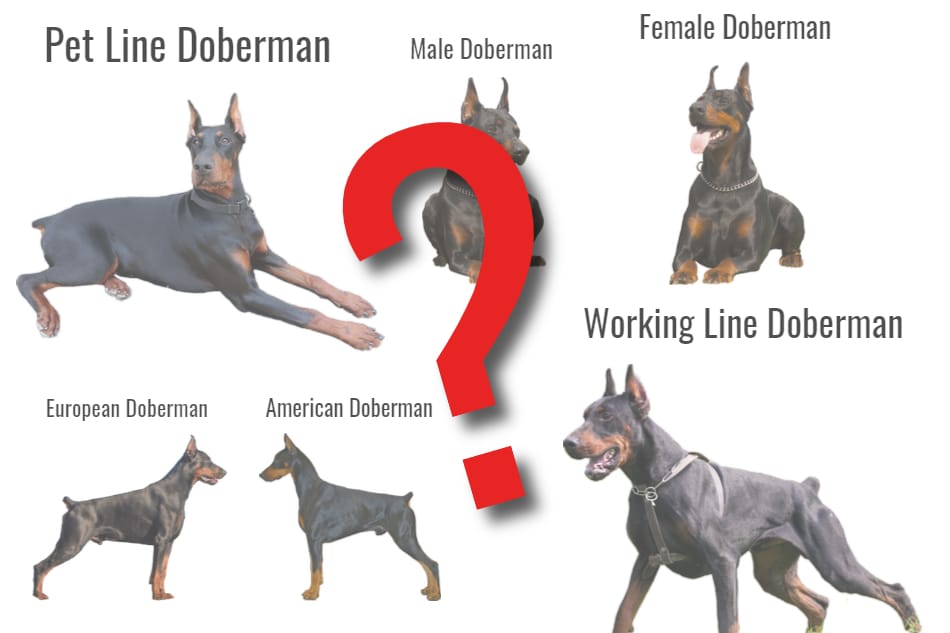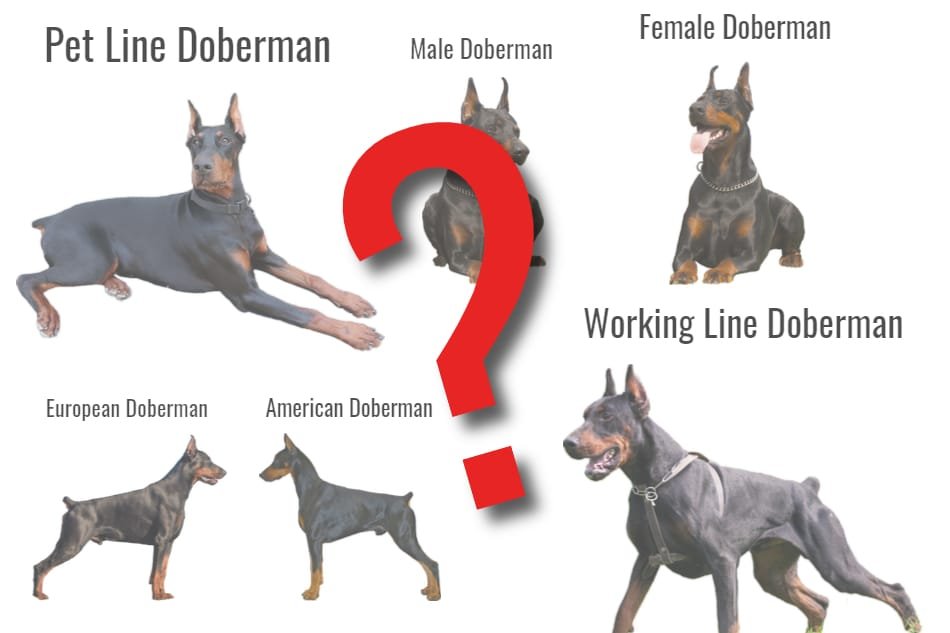Are you considering getting a Doberman as a pet? You might be surprised to learn that this majestic breed is not just known for its striking appearance, but also for its intelligence and loyalty. With their sleek coat, strong physique, and natural guarding instincts, Dobermans have earned a reputation as excellent family dogs and protectors. But is a Doberman the right choice for you?
Dobermans have a rich history that dates back to the late 19th century. Originally bred by a German tax collector named Louis Dobermann, who wanted a loyal and fearless dog to protect him during his rounds, the Doberman Pinscher soon became popular for its versatility and loyalty. Today, Dobermans excel in various roles, including search and rescue, therapy work, and service dog duties. In fact, studies have shown that Dobermans have a higher success rate in bomb and drug detection than other breeds. Their intelligence and trainability make them ideal candidates for specialized tasks.
If you’re looking for a loyal and intelligent companion, a Doberman might be the perfect choice. Known for their protective nature and impressive athleticism, Dobermans make excellent family dogs. They are highly trainable and make great watchdogs. However, keep in mind that Dobermans require regular exercise and mental stimulation. They may not be suitable for first-time dog owners due to their strong-willed nature. Consider your lifestyle and commitment before deciding if a Doberman is the right breed for you.

Do I Want a Doberman?
Are you considering getting a Doberman as a pet? Before making this decision, it’s essential to gather all the necessary information to determine if a Doberman is the right choice for you. This article will provide you with detailed insights into what owning a Doberman entails. Read on to find out if you want a Doberman!
Temperament and Personality
Dobermans are known for their loyal and protective nature. They are intelligent, confident, and highly trainable dogs. However, they require a firm and consistent hand in their training to ensure good behavior. Dobermans thrive in a structured environment with clear rules and boundaries.
While Dobermans are affectionate with their families, they can be wary of strangers. Their protective instincts make them excellent guard dogs. It’s important to socialize Dobermans from a young age to prevent any aggression towards unfamiliar people or animals.
Dobermans are energetic and require regular exercise to keep them happy and healthy. They need daily walks, playtime, and mental stimulation to prevent boredom. If you lead an active lifestyle and are willing to invest time in exercising your Doberman, they can be a great companion.
Grooming and Maintenance
Dobermans have a short coat that is low-maintenance. They require regular brushing to remove loose hair and keep their coat in good condition. Additionally, they should be bathed as needed, usually every few months.
It’s important to note that Dobermans are prone to certain health conditions. Regular vet check-ups and vaccinations are essential to ensure their overall well-being. Additionally, their nails should be trimmed regularly, and dental hygiene should be maintained.
Exercise Needs
Dobermans are an active breed and require a significant amount of exercise. They need daily walks, runs, or play sessions to burn off their energy. A tired Doberman is a happy and well-behaved Doberman.
Consider incorporating activities that mentally challenge your Doberman, such as obedience training or agility exercises. These activities will keep their minds sharp and prevent them from becoming bored, which can lead to destructive behavior.
Training and Socialization
Proper training and socialization are crucial for Dobermans. They are intelligent dogs that respond well to positive reinforcement-based training methods. It’s important to start training your Doberman from an early age to establish good behavior and manners.
Socialization is equally important to ensure that your Doberman is comfortable and well-behaved around people, other animals, and various environments. Expose your Doberman to different situations, sounds, and experiences to build their confidence and reduce the risk of anxiety or fear-based behaviors.
Lifestyle Considerations
Before deciding if you want a Doberman, consider your lifestyle and whether it aligns with the needs of this breed. Dobermans thrive in an environment where they receive plenty of exercise, mental stimulation, and human interaction. They are not well-suited for a sedentary or solitary lifestyle.
Dobermans are not recommended for first-time dog owners or families with young children, as they require experienced handling and training. They can be dominant and assertive if not properly managed. However, with the right owner who can provide leadership and guidance, Dobermans can be wonderful companions.
Benefits of Owning a Doberman
Despite their exercise and training needs, owning a Doberman can be incredibly rewarding. Here are some of the benefits of having a Doberman as a pet:
- Dobermans are fiercely loyal and protective of their families
- They are intelligent and easily trainable
- Dobermans make excellent guard dogs
- They have a sleek and low-maintenance coat
- With proper socialization, they can get along well with other dogs and animals
Should You Get a Doberman?
After considering the temperament, grooming needs, exercise requirements, and lifestyle considerations of a Doberman, you can make an informed decision about whether you want to welcome one into your life. If you are an experienced dog owner who is dedicated to providing the necessary time, training, and exercise, a Doberman can be a loyal and loving companion.
Key Takeaways – Do I want a Doberman?
- Dobermans are intelligent and loyal dogs.
- They require regular exercise and mental stimulation.
- Dobermans can be protective and will need proper socialization and training.
- Consider if you have the time and resources to commit to a Doberman’s needs.
- Dobermans may not be suitable for every family or living situation.
Frequently Asked Questions
Are you considering getting a Doberman as a pet? Here are some common questions and answers to help you decide if a Doberman is the right dog breed for you.
1. What are the characteristics of a Doberman?
Dobermans are known for their loyalty, intelligence, and protective nature. They are medium to large-sized dogs with a sleek and muscular build. They require regular exercise and mental stimulation to keep them happy and healthy. Dobermans are also known for their alertness and make excellent guard dogs.
However, it’s important to note that Dobermans require early socialization and training. They can be strong-willed and may exhibit aggressive behavior if not properly trained. It’s crucial to provide them with a structured environment and consistent leadership to ensure they become well-behaved companions.
2. Are Dobermans good with children?
Dobermans can be great family dogs and are generally good with children when properly socialized from a young age. They are often protective of their families and can be gentle and affectionate with children they have been raised with. However, it’s important to supervise interactions between Dobermans and young children to prevent any accidental injuries due to their large size and exuberant nature.
Like with any dog breed, it’s crucial to teach children how to appropriately interact with dogs and to never leave them unsupervised. Proper training and socialization can help ensure a positive and safe relationship between a Doberman and children.
3. How much exercise do Dobermans need?
Dobermans are an active breed and require a significant amount of exercise to keep them physically and mentally stimulated. They thrive in an environment where they can engage in regular physical activities such as walks, runs, or play sessions. Ideally, they should receive at least an hour of exercise every day.
Failure to provide sufficient exercise for a Doberman can result in behavioral issues and pent-up energy, which may lead to destructive behavior. If you lead a sedentary lifestyle or do not have the time and commitment to provide adequate exercise, a Doberman may not be the right choice for you.
4. Do Dobermans have any health issues?
Like many dog breeds, Dobermans are prone to certain health issues. Some common health concerns in Dobermans include dilated cardiomyopathy (a heart condition), hip dysplasia, von Willebrand’s disease (a bleeding disorder), and hypothyroidism.
Regular visits to the veterinarian and maintaining a healthy lifestyle, including proper nutrition and exercise, can help mitigate the risks of these health issues. It’s also important to obtain a Doberman puppy from a reputable breeder who conducts health testing on their breeding dogs.
5. What is the average lifespan of a Doberman?
The average lifespan of a Doberman is around 10 to 13 years. However, with proper care, some Dobermans have been known to live longer. Regular veterinary check-ups, a balanced diet, exercise, and a loving environment can help ensure a Doberman lives a long and healthy life.
It’s important to be prepared for the commitment and responsibility that comes with owning a Doberman. They require proper training, socialization, exercise, and healthcare to thrive and be happy companions. Consider all the factors and make an informed decision based on your lifestyle and ability to meet the needs of a Doberman.

Do you want a DOBERMAN? Check This!
If you’re considering getting a Doberman as a pet, there are a few things to consider. Dobermans are known for their loyalty, intelligence, and protective nature. They make excellent guard dogs and are highly trainable.
However, Dobermans require a lot of exercise and mental stimulation. They are an active breed that needs daily walks, runs, and playtime. They also need regular training and socialization to prevent behavioral issues.
Dobermans can be great family pets if properly trained and socialized from a young age. However, they may not be suitable for households with young children or small animals due to their high energy levels and prey drive.
Before making a decision, it’s important to assess your lifestyle and commitment to provide the necessary care and attention for a Doberman. Consider consulting with a reputable breeder or a veterinarian to learn more about the breed’s specific needs.
